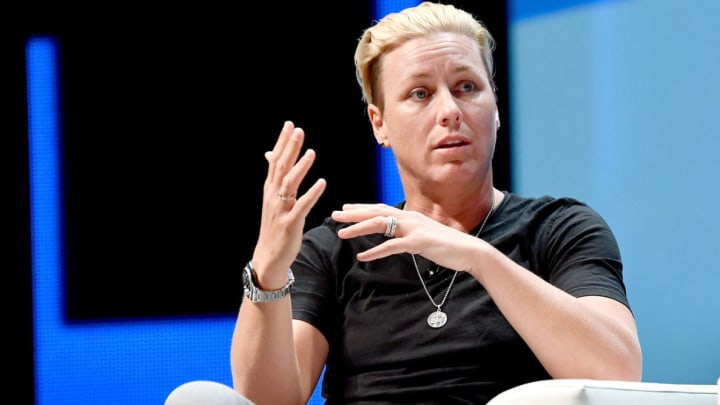Abby Wambach on FIFA's Women's World Cup 'BS' and Her Post-Playing Life

On the latest episode of the Planet Fútbol Podcast, USWNT legend Abby Wambach speaks to SI.com about a number of things in a wide-ranging interview about her new job advising Copa90 on its women’s soccer coverage; the influence of her wife, the bestselling author Glennon Doyle; her new video with Mia Hamm and Julie Foudy and her new book coming out next April, called Wolfpack: How Women Claim Power, Unite and Change the Game.
You can listen to the full conversation in the podcast console below and subscribe to and download the Planet Fútbol Podcast on iTunes. Recent guests include former U.S. men's national team forward Eddie Johnson, ex-U.S. standout Tony Sanneh, broadcasters Bob Ley and Derek Rae, U.S. and Columbus Crew goalkeeper Zack Steffen and RB Leipzig assistant and former New York Red Bulls manager Jesse Marsch.
Here's a selection from a fascinating interview:
On FIFA allowing the men’s Gold Cup and Copa América final games to take place on the same day as the Women’s World Cup final next July—and on FIFA’s recently announced prize money for the next Women’s World Cup, which is being doubled from $15 million to $30 million but is also part of the gap in prize money between the men’s and women’s World Cup increasing over the past four years.
“Well, I don't know if I can swear on this podcast—you can—but it's bulls---. It's just bulls---. I'm beyond angry that the women will have to share a day that their final is on with two other major championships. It's literally the biggest slap in the face that FIFA can throw at the women for every kind of reason. I've actually been pretty outspoken. I’m trying to figure out the next best steps in creating a campaign to boycott all of the FIFA sponsorships, because I just think the only way FIFA will get it is if they actually feel it financially. And FIFA has loads and loads and loads of money … And then increasing the prize money but oh, wait, hold on a second, it's actually increasing the pay gap? Like, what kind of change are you trying to make? And what kind of messages are you sending? ... We're getting all these constant messages from the world—from FIFA, from the government, from whoever—that we [women] actually are less than human. And I don't know when it's going to end, and I don't know how the hell we can actually hold FIFA accountable.”
On the influence of her wife, Glennon Doyle, who’s also a bestselling book author:
“The thing when I first met Glennon that was my biggest struggle was I had just gotten a DUI and was really struggling to figure out how I was going to deal with that, and then dealing with these issues that I was having internally, however you want to define your own circumstance. I was having a lot of issues figuring out my addiction problem to alcohol, and that problem created tons of other problems in my life that I had to really do some serious work around.
When I met Glennon, she was 14, 15 years sober, and she was like one of those visions for me of possibility. And what started as a friendship turned into a relationship and turned into a marriage and turned into what it is now. She is one of the few people in the world in my mind who is truly trying to go after and dig into the weeds of life and try to figure out: Why are we so divided? Why are we in this experience right now? The 2016 presidential election happened, and misogyny started to rise and racism and white supremacy and all these things that my wife is fearless and unafraid to figure out and learn and educate herself around some of these topics. She's created this beautiful community of badass women and leaders in their own homes and own communities, and the way that she's done it is just ethically authentic and radically honest.
Me meeting her was the best thing that ever happened to me. What she shows me everyday isn't just a sober life. It’s actually: Being sober is what makes life beautiful and connected and hard and human.”
On why she decided to put herself out there more publicly recently:
“After I retired I spent a long time trying to figure out what the heck it was I wanted to do, what it was I was going to be good at, what it was I was going to enjoy as a passion. Having played at the highest level for so long, my standards are unfortunately quite high, for not just myself but for my experience. I definitely needed to step away from the game and kind of reevaluate what I wanted in my life. That's why it took me a little while to organize my thoughts and organize my feelings about what I wanted for the rest of my life. Because as you know, most women athletes actually have to reimagine and reorganize to put themselves back into the work world. Not because they want to, but because they have to.
So many male athletes don't have that same experience because they make enough money to end their careers, and I wasn’t one of those kind of players, unfortunately, because I played women’s football. And I think when I retired with that understanding and the level of expectation I have for my life, I wanted to make sure I invested in myself in the right things.”
